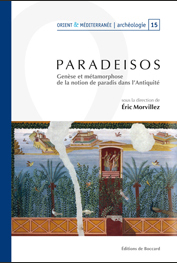PARADEISOS
Genèse et métamorphose de la notion de paradis dans l’Antiquité

sous la direction de Éric Morvillez
Depuis le célèbre volume de Jean Delumeau sur le « jardin des délices », le paradis fantasmatique des Anciens nous semblait plus familier : il a donné ses racines aux jardins des périodes médiévale, modernes et contemporaine. Après les études fondatrices des horti romains par Pierre Grimal ou des jardins des cités du Vésuve par Wilhelmina Jashemski, les spécialistes de l’Antiquité classique ont choisi de reprendre pour leurs études le terme de paradeisos qui leur paraît bien défini. Le mot renvoie pourtant à des conceptions et réalités très diverses. C’est le long processus d’héritage et de transformation de ce vocable que souhaite aborder ce livre, développement des débats, largement enrichis par leurs contributeurs respectifs, d’un colloque tenu en Avignon, au Palais des Papes, au printemps 2009. L’occasion de reformuler par une démarche transversale et comparatiste la genèse et les métamorphoses du concept de paradis : de l’Éden biblique aux parcs assyriens ou perses, des paradeisoi hellénistiques imités aux jardins romains ordonnancés, de l’avatar du paradisus chrétien à l’ultime déclinaison profane omeyyade.
Archaeology and the history of the gardens have taken since a few years a new place in the research on Antiquity. The recourse to the concept of the original Paradise, that of the Genesis or that of the ancient Near East sovereigns, has served the speech on the birth of art of gardens in the Mediterranean, both in the Hellenistic and Roman world. Since the famous volume of Jean Delumeau on the “Jardin des délices,” the fantasy paradise of the Ancients seemed more familiar: it has given its historical roots to the gardens of medieval, modern and contemporary times. After the founding studies of Roman horti by Pierre Grimal or of gardens of the cities of Vesuvius by Wilhelmina Jashemski, the specialists of classical Antiquity have chosen to take again the term of paradeisos for their studies, which seemed well defined for them. The word refers however to very various concepts and realities. It is the long process of inheritance and transformations of this vocabulary that wishes to address this book, development of debates, widely enlarged by their respective contributors, of the colloquium held in Avignon, in the Palace of the Popes in the spring of 2009 – an opportunity to rephrase by an interdisciplinary and comparative approach the genesis and the metamorphoses of the concept of paradise: from the biblical Eden to the Assyrian or Persian gardens, from the imitated Hellenistic paradeisoi to the formal Roman gardens, from the avatar of the christian paradisus to the ultimate Ommayad secular version.




